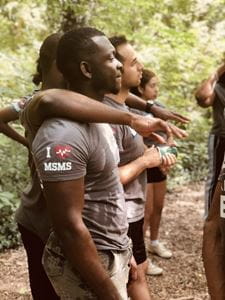The Master of Science in Medical Science (MSMS) program represents the strongest recruitment and retention pipeline for equitable representation in medical education at IU School of Medicine. This year, it celebrates its 25th anniversary.
The origins of the program extend back to the nineties. In 1994, Walter Daly, MD, a faculty member who formerly served as Dean, was appointed to review the recruitment and retention of underrepresented students at IU School of Medicine.
During this process, George Rawls, MD, who served as Assistant Dean, recommended to Daly the formation of the Master of Science in Medical Science (MSMS), which launched in the summer of 1995. Founding members included Joseph Christian, MD, PhD, chair; William Bosrom, PhD; Fred Ficklin, MEd; Edward Harper, PhD, Robert Harris, PhD, and George Rawls, MD.
Rawls, one of the first black surgeons to practice in Indianapolis, served as the founding director of the MSMS program. He attended Howard University College of Medicine, served in the Army and completed a surgical residency at The Ohio State University. Subsequent directors have included Edward Harper, PhD, William Agbor-Baiyee, PhD, Ronald Shew, PhD, and Vicki Bonds, MS, MEd.
Twenty-five years later, the program continues to grow. Out of 429 students, 296 have matriculated into medical school–177 of whom have attended IU School of Medicine. The MSMS program currently represents the primary pipeline for infusing the school with better, more equitable representation.
The purpose of the MSMS program is to prepare those who want to improve their medical skills as they aim for matriculation into medical school. Students hail from a variety of backgrounds around the country and world. Faculty and staff provide ample resources, support and overall exposure to didactic instruction.
“We are rigorous and truly prepare students for success in medical school,” said Vicki Bonds, MS, MEd, current director of the program. “And once students come to IU School of Medicine, they love it. There are so many opportunities here in addition to multiple campuses and scholarly concentrations. We provide the support students need so they can reach their goals.”
Bonds has a long history of serving students at Indiana University who are underrepresented in medicine. She is the fifth director of the program.
“Programs like this are extremely important to better reflect how diverse we are as a nation. We need equitable representation across all professions so that the best and brightest are recruited into research, development, innovation and progress. We also need diverse individuals around the table to address unique needs,” Bonds said.
The program has helped alumni launch into leadership positions at IU School of Medicine, such as Haider Al-Awadi, who currently serves as the Class of 2022 President and is pursuing a Business of Medicine scholarly concentration.
“Looking back, the MSMS program helped me tremendously in adapting to medical school. I was able to cultivate better study habits and learn material that I would be exposed to in medical school,” Al-Awadi said.
Other alumni echo this experience. Rhea Sharma, a first-year medical student at IU School of Medicine, found the hands-on learning and honing of clinical skills incredibly beneficial. And Stacey Adjei, another first-year medical student who successfully matriculated into IU School of Medicine, valued the genuine care for student success and well-being.
Students also find value in expanding their networking opportunities and relationships with individuals at the school. Brayan Marino is in his first year of the MSMS program and was drawn by the faculty, location and resources.
“The MSMS program has allowed me to make connections with professors and given us opportunities to see how they teach. Human physiology and anatomy have been my favorite classes so far,” Marino said.
Reflecting global awareness, the program helps individuals from various locations around the world. Osama Saadoon, originally from Baghdad, Iraq, learned about the MSMS program while working as a scribe in the Emergency Department of the University of Virginia health system. After meeting a resident who had attended the program, he applied, drawn by the individuals who are involved in the program.
“The experience has been astonishing so far. The strongest part of this program is its ability to open new doors for new opportunities, including admission to medical school, and building relationships that can guide to different career pathways. The curriculum is another strength that makes this program stand out as a unique opportunity to gain experience in didactic instruction,” Saadoon said.
One of the most rewarding aspects of the program is bearing witness to the contributions made by graduates. “It is amazing to see alumni who have entered the field and are making a real impact. Many come back and mentor other students,” Bonds said.
For a quarter of a century, the MSMS program has worked to ensure more equitable representation in medical education. As the program continues to grow and evolve, Bonds foresees instilling deeper local and global community service initiatives into the program, which reflects a high priority at IU School of Medicine.
“Over the next five years, we plan to expand opportunities for students to give back to our local Indianapolis community and to learn more about the importance of global health disparities through international service,” she said.
George Rawls, MD, the founding director of the MSMS program, was one of the first black surgeons to practice in Indianapolis, beginning in 1959. To celebrate Black History Month, the Ruth Lilly Medical Library is featuring the traveling exhibit, “Opening Doors: Contemporary African American Academic Surgeons,” from Feb. 10 – 21. The exhibit celebrates the achievements of these pioneers in medicine by highlighting four contemporary pioneer African American surgeons and educators who exemplify excellence in their fields and believe in continuing the journey of excellence through the education and mentoring of young African Americans pursuing medical careers. This exhibit was developed and produced by the National Library of Medicine and the Reginald F. Lewis Museum of Maryland African American History and Culture.
